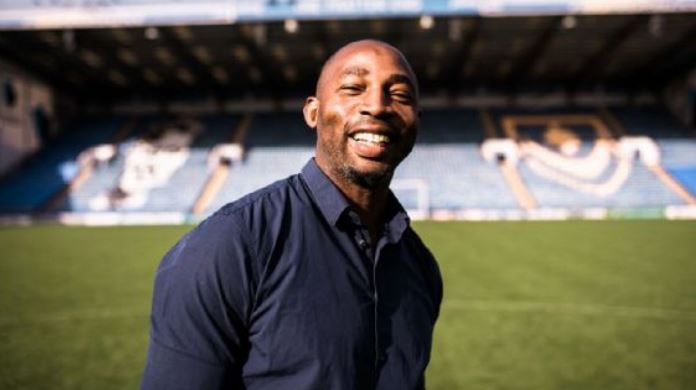The incredible story of Vincent Pericard : from billion-dollar Football player to CSM at British Telecom

There is no right or wrong path to become a Customer Success Manager.
And Vincent Pericard is the perfect example.
Once named as the next billion-dollar Football player when he signed with Juventus at the age of 18, he then became a CSM at British Telecom after he had to quit the game when he was 28.
What an amazing story full of humility proving once again that even the most challenging life conditions can be turned into great opportunities with resilience, perseverance and faith ! DrivingCustomerSuccess.com
**************
by Simon Yaffe, PlanetFootball
An innocuous text message led Vincent Pericard down a road which he nearly didn’t survive to see the end of.
Signed as an 18-year-old by Juventus and the subject of a documentary entitled ‘The Man Who Will Be Worth Billions’, Pericard ended his professional playing days at the age of just 28, having suffered various mental health issues – and two spells in prison.
Today, however, the former Portsmouth and Stoke City striker is making a new life for himself as a Customer Success Manager for BT.
Pericard spent his early life in Cameroon before moving to Saint-Etienne, with his mother and stepfather, when he was four. It was there that his career began after he joined the city’s renowned football club as a six-year-old.
He played as a striker, ascending through the youth ranks, and he made his debut 11 years after joining. Then, after just two appearances for Les Verts, Juventus snapped him up, together with fellow French youth prospects Aboubacar Fofana and Frantz Bertin.
“I knew I was good, but I never dreamed – or expected – to be picked up by Juventus,” Pericard recalls. “I played a couple of games for Saint-Etienne and then Juventus spotted me playing in a tournament for the France Under-17s.
“I had just finished my baccalaureate, which is the equivalent of A-levels, and I remember my stepfather driving me from Saint-Etienne to Turin.”
He joined a Juventus side boasting a roster of world-renowned talent, including compatriots Zinedine Zidane and David Trezeguet, as well as Edgar Davids, Pavel Nedved and Alessandro Del Piero.
“I didn’t feel any pressure but, looking back, maybe it was because I was 18 and naive,” he says. “I trained with the first team almost immediately and they all made me feel really welcome, whether that was through banter or certain players offering me their support.
“Zidane, I remember, moving past me with the ball so effortlessly, as if he was flying, while Del Piero’s first touch was absolutely faultless. I was able to keep up with the quality and standard which made me think, ‘yes, I belong here’. I adapted to a certain level.”
Having finished top scorer with the Bianconeri’s second string, Pericard made his first-team debut when he came on as a substitute against Arsenal at Highbury in the Champions League in March 2002. Playing against Thierry Henry, as well as Patrick Vieira, he kept the latter’s jersey at the end of the match.
The future looked bright – but then came the text message.
Pericard, Fofana and Bertin went for a drink and decided to invite their Italian tutor along. Pericard sent her a message and, minutes later, one of Juventus’ directors called him, asking him why he had invited his girlfriend out.
Days later, all three players were shipped out on loan, with Pericard heading to Portsmouth, who were then in the second tier under Harry Redknapp.

He says: “That text message did not go down well, at all. Later, one of the directors called me into his office and told me I was going to England. It was the end of my time at Juventus.
“I didn’t know anything about England, I didn’t speak English and there were no negotiations. I was upset and hurt, and didn’t think I deserved it. I didn’t do anything malicious and Juventus’ reaction was excessive. It was a shock to the system, but I had to suck it up and adapt quickly.”
Freshly landed on the South Coast, Pericard struggled for the first couple of weeks. However, after scoring on his Pompey debut – a 2-0 win against Nottingham Forest – he quickly settled and helped his side, which included Gianluca Festa and Paul Merson, achieve promotion to the Premier League at the end of the 2002-2003 season.
He netted nine times in all competitions while adding six assists. “Scoring that first goal changed everything for me because I really felt the spirit of the fans,” Pericard says. “I experienced what it was to become a first-team footballer, to score goals and be adored by the fans.
“Harry Redknapp knew how to get the best out of me. He’d tell me he didn’t care what I did Monday to Friday, as long as I performed on a Saturday. Harry made me feel empowered and made sure that I wanted to give my best.”
Pericard tore his left quadricep in the penultimate game of the season and, as Pompey were beginning their maiden Premier League campaign, the injuries began to rack up.
First, there was a torn thigh muscle and, in a comeback game for the reserves, he suffered the dreaded anterior cruciate ligament injury, which ended his season. It was the start of his spiral into depression.
“When I tore the quad for the first time, I didn’t know how to deal with it and I thought I would be okay within a couple of weeks,” Pericard, who was capped for France Under-21s, remembers.
“Then I suffered more injuries and I became frustrated because I was worried that people would begin to lose faith in me. I started questioning everything and ended up in a vicious cycle.”
He took in loan spells at Sheffield United and Plymouth Argyle, before following Argyle boss Tony Pulis to Stoke City, where he signed on a permanent basis in the summer of 2006. But, having scored just twice in the league, his place was taken by Ricardo Fuller.
He also had reservations about Pulis’ pragmatic style of play. “I did well under him at Plymouth, but at Stoke it was the first time I had been exposed to this type of football,” the 38-year-old says.
“I was taught how to play football in France and Italy, which was much more tactical and about playing the game on the floor, not bypassing the midfield. I was confused and again began to doubt myself.”
He began to rely on alcohol and gambled and womanised until, in August 2007, he was sentenced to jail for perverting the course of justice after he was caught speeding.
A relative initially took the blame, but then admitted he hadn’t been in the car, and Pericard was sent to HM Prison Exeter for four months.
After his release, he returned to Stoke but was soon back in prison – this time at the notorious Strangeways in Manchester – following issues with his electronic tag.
Pericard says: “It was one of the hardest times of my life, but also one of the best because it taught me a lesson. The first time I was in prison was okay, as I kept fit and got through it, but the second time nearly broke me.
“I felt there was nobody to help me or understand me, and I basically gave up. Thankfully, the other inmates did not know who I was until my last day. I was glad about that because I could have been targeted, as there were some bad people in there.”
Stoke sent him on loan to Southampton for two months at the back end of the 2007-08 season before he returned to the Potteries for the following campaign, which was their first in the Premier League.
Yet through it all, his mental health was deteriorating and, at one point, he considered suicide. “I looked at a bottle of sleeping pills in my bedroom and thought about it,” Pericard says. “I thought, ‘I could take six or seven and maybe still wake up in the morning but, if not, nobody would even notice’.”
Recognising that something was wrong, Stoke sent him to their sports psychologist, having been one of the first English clubs to appoint someone to that position. Diagnosed with depression, he began to get on the right track by working with the psychologist.
Football, though, can be a brutal business and he was released by Stoke in the summer of 2009. Pericard moved down to League One, first with Carlisle, where he scored a brilliant scorpion goal as the Cumbrians upset Norwich in the FA Cup, and then Swindon, where he stayed for two seasons.
He was released in 2011 following Swindon’s relegation and played a handful of games with non-league Havant & Waterlooville at the start of the following campaign before deciding he’d had enough. Pericard hung up his boots and moved back to the South Coast to be closer to his daughter.
He went on to set up a management company, which assisted foreign players after they had moved to British shores, before earning a first-class degree in Business Enterprise Development from the University of Portsmouth. That was followed by a Master’s in Accounting and Finance.
And, thanks to those links, he forged a partnership with the university, which adopted his mobile app ‘WhatsUp?’. It provides access to the university’s wellbeing and mental health services and currently has more than 2,000 users.
“That number came about due to lockdown,” Pericard, who now lives in London, says. “There was an upturn in sign-ups during that period and it became the central app for the university to use to support those students who were feeling isolated and lonely.”
Adding another string to his bow, he is also an alumnus of the BT graduate scheme and now deals with global companies such as Coca-Cola and Unilever for BT.
Pericard is now in a good place, healthy and happy. Yet he does have regrets about his football career.
“There is so much more understanding about mental health today,” Pericard says. “I just wish I knew then what I know now.
“It would have not only helped me but others who were going through the same struggles. I do wish I had never text that Italian tutor, but I still think what happened after it was an overreaction.”

Hakan Ozturk
Founder, theCScafe.com, #1 Weekly Customer Success Newsletter
Hakan Ozturk is a Paris-based Customer Success leader with over 15 years of experience in the computer software industry. Passionate about driving growth and delivering value to strategic customers, Hakan has established himself as a trusted industry expert. As the Founder of The Customer Success Café Newsletter and TopCSjobs.com, Hakan provides valuable industry insights and daily-updated job opportunities worldwide in the field of Customer Success. Connect with Hakan to boost your career in CS and your company’s potential for massive growth.

Leave a Reply